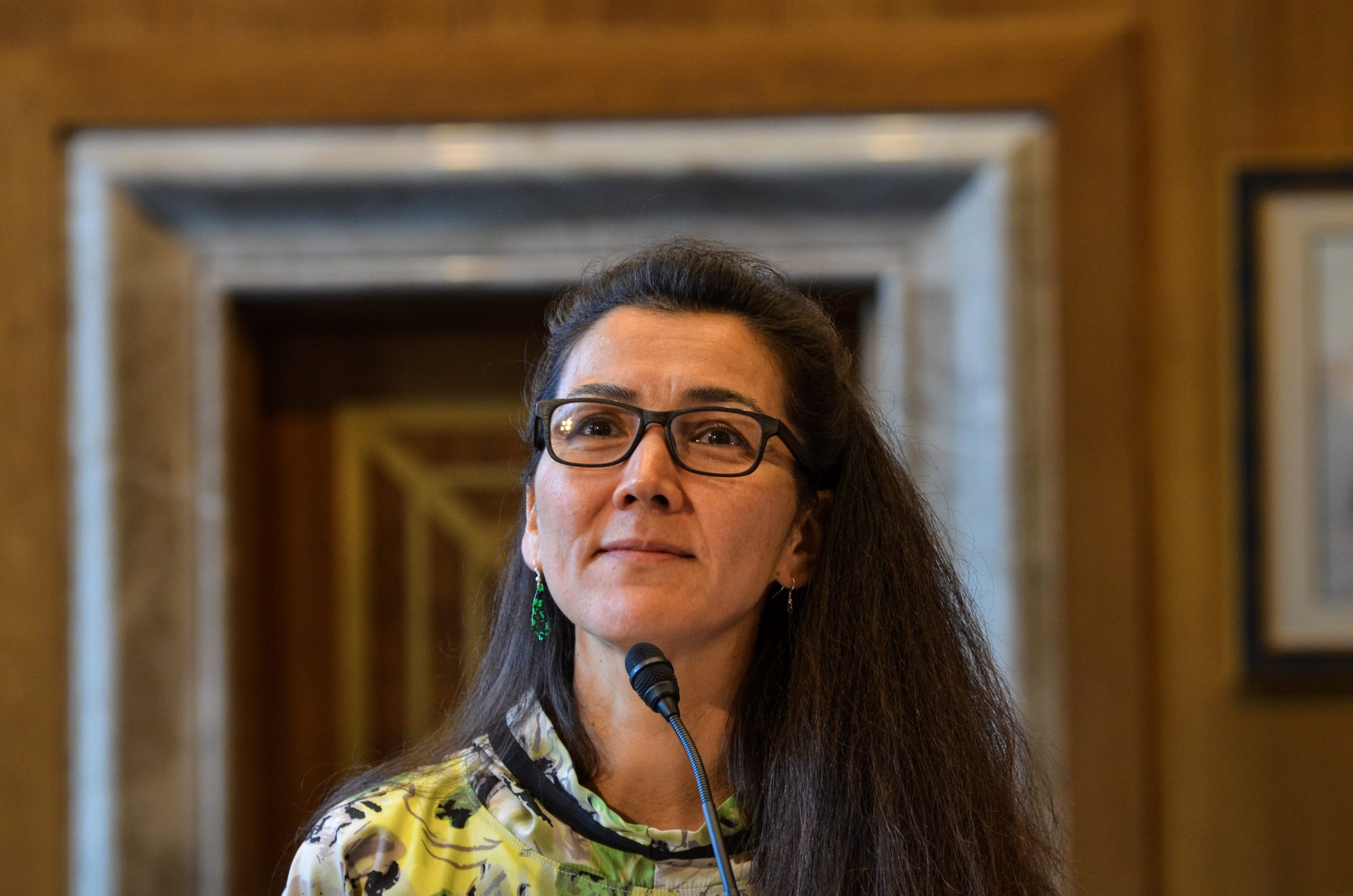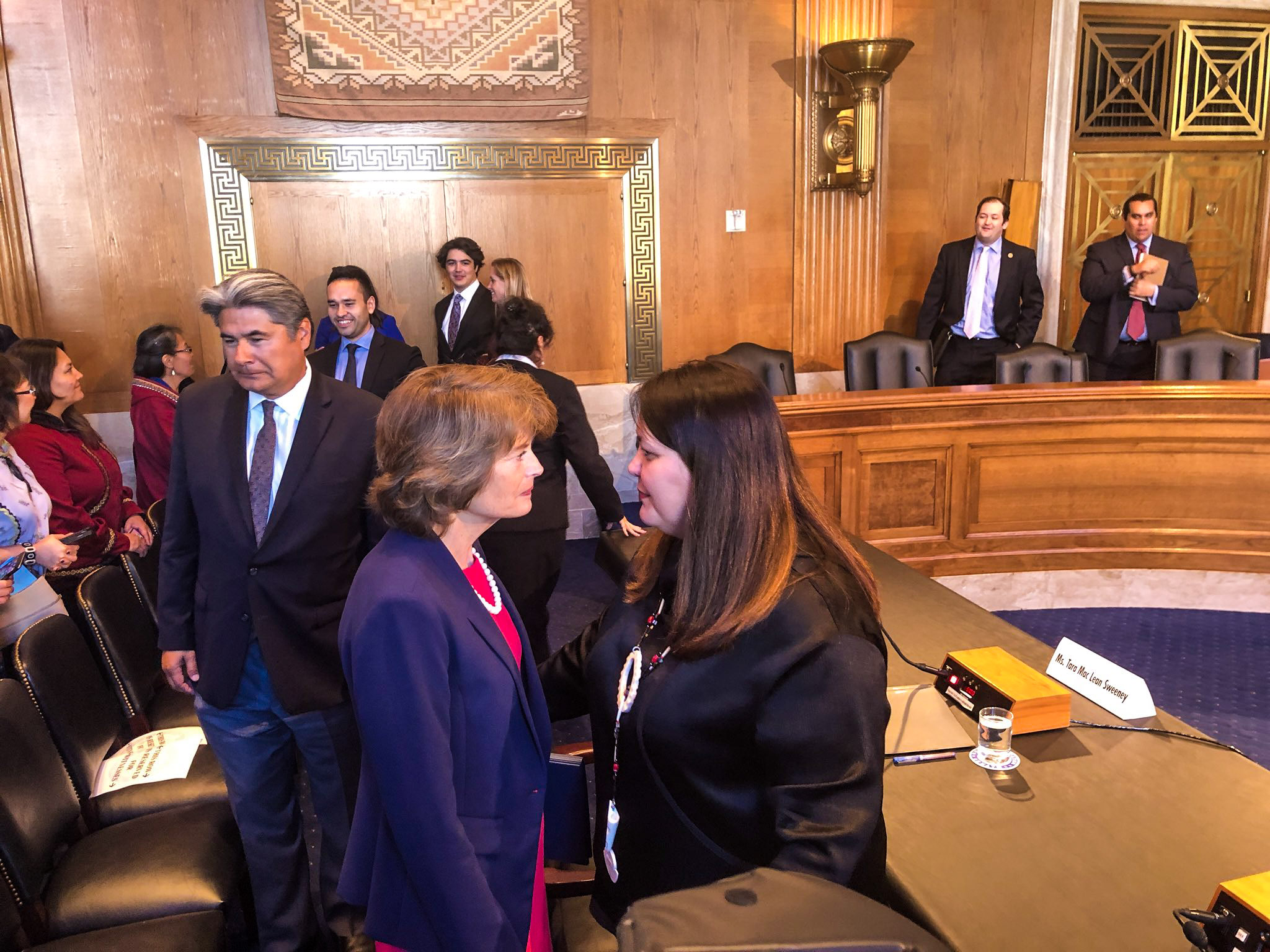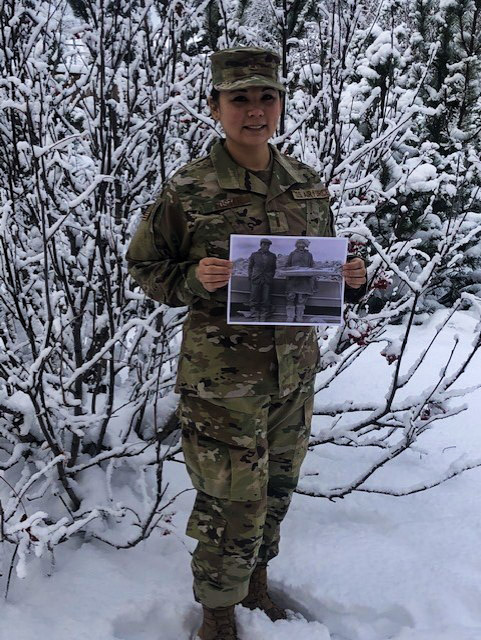Indianz.Com > News > Indian Country Today: Alaska Native candidates line up for Congressional race
Alaska Natives running in crowded congressional race
Alaskans will be voting in an open primary and a ranked choice voting system, a new process voters opted for in 2020, to fill a seat left by the late U.S. Rep. Don Young #NativeVote22
Monday, April 11, 2022
Indian Country Today
Alaskans are facing quite the U.S. Congressional election with a packed field of 48 candidates — including a North Pole city council member named Santa Claus — and a voting process that’s been tried in this country by only one other state, Maine.
Former governor Sarah Palin joins four Alaska Natives running to fill Alaska’s sole U.S. House seat, which was held for decades by the late U.S. Rep. Don Young. He died last month at age 88. Palin, who was the 2008 Republican vice presidential nominee, is the best known of the candidates nationally.
Laurel Foster
All four of the Alaska Native candidates grew up in Alaska. They include Laurel Foster, Cupik, nonpartisan, who lives in Anchorage. She enlisted in the Alaska Air National Guard as a Security Forces member in 2008 then cross trained as a paralegal.
Emil Notti
Emil Notti, Koyukon Athabascan, a Democrat, lives in Anchorage. He’s a founder and the first president of the Alaska Federation of Natives. He’s described by the Native American Hall of Fame as “a force behind the land claims movement and central to the negotiations that culminated in the Alaska Native Claims Settlement Act of 1971.”
He served as president of the regional Alaska Native Doyon Corporation, and in cabinet level positions for several governors. He also served on boards of directors for National Bank of Alaska, the Alaska Railroad, and CIRI, the Alaska Native Cook Inlet regional corporation. Notti is a Navy veteran of the Korean era. He narrowly lost the 1973 election to Young.
Mary Sattler Peltola
Mary Sattler Peltola, Yup’ik Eskimo, a Democrat, grew up subsistence and commercial fishing in the summers. She lives in Bethel in western Alaska. She served five terms in the Alaska House, where she revived and chaired the Bush Caucus, a non-partisan coalition of legislators representing areas off the road system.

Tara Sweeney
Tara MacLean Sweeney, Inupiaq, a Republican, grew up in several Arctic villages and lives in Anchorage. She’s a former vice-president of Arctic Slope Regional Corporation, an Alaska Native company with some $3 billion in revenues. She served as co-chair of the statewide Alaska Federation of Natives. She was a special assistant in Gov. Frank Murkowski’s administration and co-chair of Republican Dan Sullivan’s U.S. Senate campaign.
She worked in the Trump administration as the first Alaska Native and the second woman in history to hold the position of assistant secretary of Indian Affairs with the U.S. Department of Interior. Sweeney has served as chair of the international Arctic Economic Council representing the Inuit Circumpolar Council. She was statewide co-chair of Young’s reelection campaign.
Alaskans will be voting in an open primary and a ranked choice voting system, a new process voters opted for in 2020. The top four vote-getters in the primary, regardless of party, will go on to the general election.

Joaqlin Estus, Tlingit, is a national correspondent for Indian Country Today. Based in Anchorage, Alaska, she is a longtime journalist. Follow her on Twitter @estus_m or email her at jestus@indiancountrytoday.com.
This article originally appeared on Indian Country Today, an an independent news enterprise owned by IndiJ Public Media, an Arizona nonprofit company that sustains itself with funding from members, donors, foundations, and supporters. ICT does not charge for subscriptions and tribal media (or any media, for that matter) can use the publication’s content for free. Contribute to Indian Country Today.
Search
Filed Under
Tags
More Headlines
Montana Free Press: Blackfeet Nation citizens cite treaty rights in lawsuit over tariffs
Cronkite News: A ‘mural with a message’ rises in Arizona
Chuck Hoskin: Cherokee Nation is an economic powerhouse
Native America Calling: Philanthropy fills in the gaps
AUDIO: Examining 50 years of the Indian Self-Determination and Education Assistance Act in Indian Country
Native America Calling: The next 50 years of self-governance
Cronkite News: Food sovereignty movement promotes Native foods
VIDEO: Examining 50 years of the Indian Self-Determination and Education Assistance Act in Indian Country
Native America Calling: Fresh Native creativity with a new play and new television show
AUDIO: Native American Education – Examining Federal Programs at the U.S. Department of Education
VIDEO: Native American Education – Examining Federal Programs at the U.S. Department of Education
Native America Calling: Indigenous business and the unpredictable new trade landscape
Written testimony for Senate Committee on Indian Affairs hearing on Department of Education
Native America Calling: An imbalance of deadly force by police in Canada
‘Betrayal’: Indian Country slams closure of Department of Education
More Headlines
Cronkite News: A ‘mural with a message’ rises in Arizona
Chuck Hoskin: Cherokee Nation is an economic powerhouse
Native America Calling: Philanthropy fills in the gaps
AUDIO: Examining 50 years of the Indian Self-Determination and Education Assistance Act in Indian Country
Native America Calling: The next 50 years of self-governance
Cronkite News: Food sovereignty movement promotes Native foods
VIDEO: Examining 50 years of the Indian Self-Determination and Education Assistance Act in Indian Country
Native America Calling: Fresh Native creativity with a new play and new television show
AUDIO: Native American Education – Examining Federal Programs at the U.S. Department of Education
VIDEO: Native American Education – Examining Federal Programs at the U.S. Department of Education
Native America Calling: Indigenous business and the unpredictable new trade landscape
Written testimony for Senate Committee on Indian Affairs hearing on Department of Education
Native America Calling: An imbalance of deadly force by police in Canada
‘Betrayal’: Indian Country slams closure of Department of Education
More Headlines
